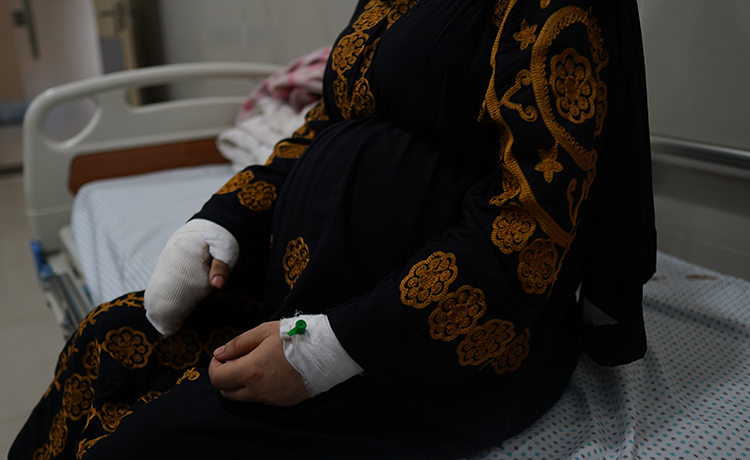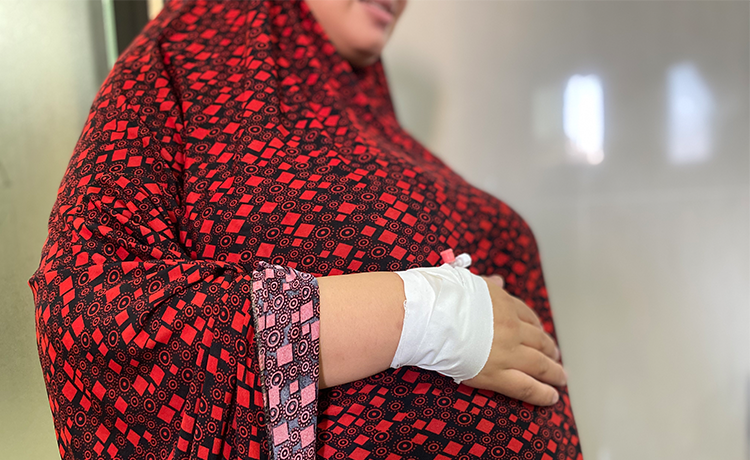News
After a month of siege, bombardments and a health system obliterated, pregnant women in Gaza are caught in a catastrophe
- 09 November 2023
News
GAZA, Palestine – “The working conditions in our hospital are catastrophic. We lack basic life necessities and we’re struggling with a severe shortage of water,” said Yasmine Ahmed, a midwife at Al-Shifa Hospital, Gaza’s largest medical facility.
After a month of escalating hostilities, the health-care system in Gaza is hanging by a thread: Fuel, medicine and supplies have all but run out and with hospitals, infrastructure and ambulances coming under fire, even transporting the injured is fraught with danger.
The World Health Organization estimates that there have been more than 235 attacks on health-care infrastructure since 7 October. As casualties mount, more than one third of Gaza’s 35 hospitals and nearly two thirds of health clinics have been forced to close. The remaining functional facilities have less than a third of their staff and even fewer resources.
The lack of fuel to run generators means Al Quds hospital in Gaza city shut down key services on 8 November, and Al Awda hospital, the only provider of maternity services in northern Gaza, warned of an imminent closure.
Dr. Nasser Fouad Bulbul, who heads the premature and neonatal care wards at the Al-Shifa hospital in Gaza City said, “We’ve seen a rise in premature births with the bombing of people’s homes. We’ve had to perform premature deliveries while the mother lay dying.”
Gaza is home to some 50,000 pregnant women with limited access to essential health services. Around 5,500 women are due to give birth in the next month – over 180 births each day – in the midst of a near-total humanitarian disaster.
“Many of these infants are now orphans,” Dr. Bulbul told UNFPA, the UN sexual and reproductive health agency.
Displaced and endangered
Sondos, 26, was heavily pregnant when she was caught up in an explosion. Pulled from the rubble, she underwent surgery and an emergency Caesarean section at Gaza’s Al-Hilo hospital – a cancer facility that has been turned into a maternity ward.
“I was transferred to the operating room for my legs because my bones were shattered…After that, thank God, I gave birth to a girl. I will name her Habiba, after her sister who was killed on the same day,” she told UNFPA. At the time of writing Sondos had yet to see her baby, who was in intensive care.
Speaking of the perils pregnant women are facing, UNFPA Regional Director for the Arab States Laila Baker said, “Put yourself in the shoes of that woman when the surgeon says to her, ‘I have no anaesthesia, I don't even have water or soap to wash my hands, but I'm going to try and save your life.’”
“Even if she survives, there will be no one to help her,” added Ms. Baker.
Raghda, 37, is overdue and has been prescribed eight doses of a medication to induce labour, without success. “I am in my tenth month, they said I need a Caesarean section. But there are so many cases, so I’m waiting my turn,” she told UNFPA. “The doctor says there is no anaesthesia… They can't give women the full dose.”

No safe space
Casualties and displaced people are streaming into health facilities in search of medical care and shelter. But with increasing electricity cuts, surgical equipment and incubator lights blink out, and the threat of yet more lives lost becomes all too real.
According to the Ministry of Health in Gaza, around 70 per cent of more than 9,700 killed since the start of the crisis are women and children, with countless more injured. One in four of Gaza’s 2.2 million people are women of reproductive age who urgently need access to reproductive health services.
Ms. Baker continued, “We try our best also to protect young girls who are in overcrowded centres and where hygiene is at best very minimal. In one centre where we work, there is one bathroom facility for a thousand people.”
Almost 1.5 million people have been forced to flee their homes, with hundreds of thousands crammed into unsafe shelters that pose a serious risk of disease outbreaks. As food and clean water run out, protection services have crumbled and tensions are boiling over – with the risks of gender-based violence rising with them.

Needs soaring after a month of hostilities
Since the border crossing in Rafah in Egypt was opened on 21 October to allow in deliveries of aid to Gaza, 650 trucks have crossed over; before the escalation of hostilities, an average of 500 truckloads entered Gaza every working day.
Two truckloads of UNFPA-provided reproductive health supplies arrived in Gaza on the weekend of 4 November, containing crucial medicine and kits to ensure safe births, including equipment and anaesthesia for Caesarean sections. These are being distributed to hospitals across Gaza, with thousands of clean delivery kits going directly to pregnant women in health facilities, shelters and other locations. Additional supplies are ready to enter, pending convoy movements.
Explaining the contents and potential of the kits, Ms. Baker said, “It's anything from a bag that has a clean plastic sheet, a clamp for the umbilical cord and a pair of scissors to cut it, a bar of soap and some wipes to ensure that at least some level of hygiene and sterile environment is protected. Those we distribute to the pregnant women when we can reach them.”
Walaa, 35, waited to see a doctor at the Al-Hilo hospital, after a bomb destroyed her home and she sustained a fracture in her skull and her right hand. She told UNFPA, “I am in my ninth month, I could give birth any moment now. Of course I’m afraid to deliver amid war… Nothing is safe. Even hospitals are not safe.”
After one month of intensifying bombardments and with the most basic resources almost depleted, UNFPA Executive Director Dr. Natalia Kanem urged in a joint plea, “We need an immediate humanitarian ceasefire. It’s been 30 days. Enough is enough. This must stop now.”